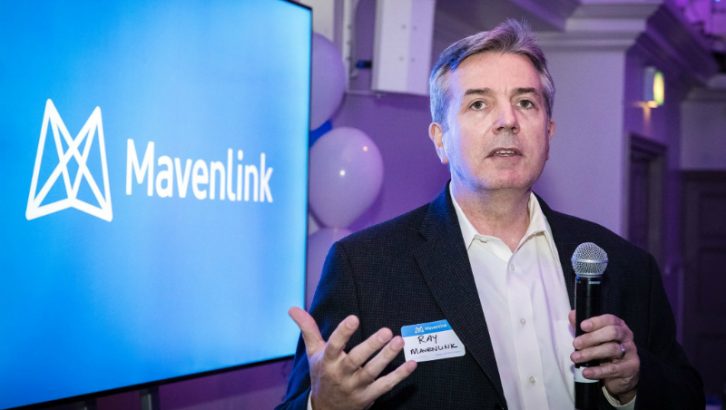Ray Grainger is the CEO and co-founder of MavenLink. MavenLink provides professional services automation software. It opened its first office in London earlier this year where we spoke to Grainger about founding and leading the startup company that is now multinational with thousands of customers.
ET: What is MavenLink’s vision?
Ray Grainger: It’s quite bold, to digitise the fee for services businesses that serve their clients on a project basis. Our intent is to have thousands and thousands of these companies and use MavenLink to improve the performance of their business. Over time, we will end up networking them all together to create a very large digital professional services network. It’s more than just a SaaS product.
ET: Can you explain further?
Ray Grainger: Today MavenLink has nearly a million people using it, thousands of companies. We recently had a resource planning summit where we brought a number of our clients from the marketing and digital agency world. They’re looking around the room at each other and they’re saying, “Wait a minute. So and so’s here. You’re our subcontractor, we contracted you.” It’s large enough now where it’ll just use natural trading partners that already are in MavenLink. They said, “Can’t you just allow us to connect our accounts so that when we have projects that you can immediately see the demand and we can see the availability of their resources? We can commercially contract much more rapidly than doing it in email.”
That’ll be the first layer that we do. We allow people who are already in MavenLink, who have already conducted business to link their accounts together and conduct business. The next stage after that, we’ll be allowing people to expand their networks with people they’ve never worked with before and discover them. The good news is with that big of a network already, there’s a high likelihood that you know them through somebody you’ve already worked with in MavenLink.
ET: What’s your vision for MavenLink?
Ray Grainger: As a partner in Accenture I really enjoyed helping to take that company public. I liked that the business community felt that Accenture was one of the best run companies in the world. We want to operate to that standard and take this company public.
MavenLink was born out of my experience at Accenture both serving my clients as well as recognising the dearth of effective technology to support the services industry.
ET: Who’s your inspiration and why?
Ray Grainger:Ernest Shackleton. I spent two years at the South Pole as a teenager. I read The Endurance while I was a senior in high school 40 years ago. Many dimensions of that are around the entrepreneurial spirit. The way he selected teams to help in those endeavours has been foundational to me.
ET: How do you describe your leadership style?
Ray Grainger: Collaborative, open, transparent, extraordinarily transparent, direct, and the ability to paint a clear target for where we’re headed.
ET: What are your personal challenges for the next 12 months?
Ray Grainger: It’s all about the execution challenge of our business. We have a very clear market, a very large market. We’re well capitalised and we’ve raised the capital to launch an international expansion. Ensuring that we have a culture that’s maintained as we scale and that the foundational goodness of MavenLink is maintained. That our seven offices around the world execute our plan and execute our strategy.
ET: What was your darkest business day and how did you overcome it?
Ray Grainger: We started this business in September 2008 and in October 2008, the world economy fell of the cliff. Fortunately I had sold some of my founder’s stock at Accenture to seed the company just prior to the crash. We thought the recession would last years and were unsure if we were going to be able to raise the capital required to grow this business. We estimated that to be about a hundred million dollars. We had seeded it with several million to get it going out of our own personal money.
I thought we would have to stretch that much longer than we had ever planned. We had anticipated working for six months on no pay but it ended up being three years where we did not pay ourselves.
ET: What was your proudest moment?
Ray Grainger: The proudest moment was when we actually launched the product. There was a personal pride in the product and the personal satisfaction of being able to start the business. It’s changed over the years. We have approaching 300 employees and I have to look at providing for their careers. They’ve got children, they’re going to school and we’re helping them raise their families. Now it’s become a different focus of helping create an economic system for them versus just, “Look at me. I’ve created a company.”
For example, I have one employee who is probably employee number five. She came to the company, had not graduated from college and had two children. Her peers had master’s degrees. She was a top performer and over the next three years went to night school and graduated with her bachelor’s degree while continuing to take more senior positions in the company. At the end of June, she’ll be finishing her master’s degree.
Just seeing people be able to create lives for themselves, provide for their families, perform well in the company and create careers for themselves is very satisfying.
ET: Can you share a tip for someone who’s just about to start being a CEO?
Ray Grainger:Really leverage your network. It’s a tough slog going alone. I would also make sure you have at least two other co-founders. Don’t go it alone and don’t do with just one co-founder, have at least three people. You can leverage each other’s networks, leverage each other’s ability to raise capital and test your thinking, so you won’t be unidirectional. It really is about the other people that you bring around you to help you get started.
ET: Why three rather than two?
Ray Grainger: Two can be polarising. It’s hard to break a log jam if you have different opinions. I’ve seen a lot of companies start with two co-founders. They’d end up failing. They just can’t get through the difficult early stages of the company. With three there’s always that tie-breaker. Plus, you’ve got this additional leverage of their networks and resources. With one you’ll just have too few resources. In my experience three is an ideal number.
ET: What is the latest business book you read?
Ray Grainger: It’s a human story that I think is very fundamental to business, Sapiens: A Brief History of Humankind. Just a really, really profound book about what makes us human and how we think the way we do. How we create communities and businesses.
ET: What is on the radar in terms of future tech for MavenLink?
Ray Grainger: We see our product as a hub. We sit between CRM systems and ERP or general accounting systems. Most of the time, organisations will select us first if they don’t have an ERP system. We ask them what CRM system they use and most already have Salesforce so we integrate with that.
We continually push the boundaries out. The software integrates with JIRA and maybe we’ll put agile capabilities in the product. We might expand the financials into revenue recognition within MavenLink versus in the ERP system.
The key thing is incorporating AI to optimise the services supply chain. The gateway for all of that is the resource planning capability of MavenLink. It has the broadest resource planning and management capability in the marketplace today. From long range planning to I need the staff on this project today.
We are putting in more and more cognition and automating that in the system. It is an alternative to people having to sort large amounts of data to make determinations on the best or optimal staffing or decisions around should I hire or contract. What the mix of contractors and what skills are based on my revenue plan and the kind of services offerings I’m going to put in play this year. There’s just so much data, so many decisions, that we could put that much more cognition in the application to help them to make those decisions.
ET: You’ve taken MavenLink through several funding rounds. How has that process evolved?
Ray Grainger: We were founder funded for the first few years of the company. However, in 2011 the venture markets were just becoming unstuck. They had been paralysed essentially for a few years. The good news is when we started our institutional rounds or Series A and Series B funding rounds, we were able to tap into our network in Southern California. High net worth individuals. Instead of having to go to venture capital firms, we were able to raise $8 million from people that we knew in our network.
That gave us the fuel to advance the company far enough along to where it attracted the traditional venture capital institutions. That allowed us to go after companies like Carrick Capital to scale the company even further and then Goldman Sachs when we looked to expand the company globally. It started with a really close circle of people that we knew, expanded one circle out with Carrick Capital. I have known one of their founding directors for many, many years. Then from that, we were able to go out to people that we haven’t worked with at all in our careers because we were an established company at that point.
I would recommend that to everybody. It’s very rare that a founder or CEO starting his company is going to get money from somebody they don’t know.
ET: When the Goldman Sachs invested happened you wrote about preparing for an IPO. Is there anything you can share on the plans for IPO?
Ray Grainger: That is the direction that I’d like to take the company. I think we need that as a beacon. Preparing a company for IPO helps you be a really, really well run company. With that in mind, we have firms, like PricewaterhouseCoopers as our auditors. The timing of that is still indeterminate.
ET: What are the key personal challenges for the next 12 months.
Ray Grainger: We are at that stage as a founding CEO where you need to spend more time working on the business than in the business. Allowing this great management team that I’ve hired to have some level of autonomy to execute our strategy and spend more time myself out in the market with key clients. Helping formulate and extend of the strategy of our business and relinquish a little bit of the day to day, even the financial management of the company, to the team.
ET: What’s the worst decision you’ve made as a CEO?
Ray Grainger: The worst decisions are just ill-informed decisions. We’ve sometimes made hires without looking far enough out. Then based on our 100% growth rate year over year, we’ve passed the ability of some of the hires that we’ve made at the senior level. That turnover is disruptive. Managing through that can be a challenge. Learning to really understand the pace you’re growing at and to look at the executive team you hire who are three, maybe four years out from where you are.
It also changes what you’re willing to pay from a compensation perspective. In the early days, you’re looking at the compensation of these people and saying, “There’s no way I’m going to pay that.” You’re better off paying it. You’ll get the experience you need upfront.
ET: You chose to start up a new office in London to service Europe. Did you consider an acquisition?
Ray Grainger: We didn’t. I’ve been reluctant on the acquisition stage at this point as far as acquiring personnel. I think it’s part of my Accenture roots to bring in people and run the playbook. The first team we hired had all worked together in a former company. They’ve been working together for the last four years in SaaS. That was sort of a semi-acquiring but not quite. There’s such a great customer base here in the UK and so many here in London that it made sense for us to begin here versus choose what might be seen as a lower cost environment in Dublin or something like that.
ET: How do you prioritise your day?
Ray Grainger: Making sure that I’m removing road blocks from my team. That they’re fully equipped to execute our business and being available to them for quick decision making on moving the business forward. I spend a lot of time making sure that the specifications for the hiring that we’re making matches our goals and then reviewing every single final offer. I’m unable to interview every single person that we’re hiring. I do look at every single final offer that we make and the person’s background of what I believe would be the fit for the company and all the interview notes that people did.
I also spend a considerable amount of time with our largest customers making sure that the trust they placed in us will help them be successful. Finally, I help our product team by leveraging the industry knowledge that I have around the product and what the industry needs in terms of the product.
ET: What’s the one question you’d like to ask another CEO to answer it?
Ray Grainger: Pick a CEO in the SaaS industry to share with me when they scaled their best practise or lessons learned in execution to a global scale. I don’t want to have to do this twice. I want to make it work the first time. When did they open multiple international offices all at the same time? Share with me the pitfalls so I can avoid them.
ET: Can you answer that question yourself yet?
Ray Grainger: There’s a movie in the US right now called The Founder. It is the story of Ray Kroc and McDonald’s. There are many lessons learned in there about when they franchised their business. How the first 20 failed until they found the secret sauce that allowed to really scale that business. I require all my team to watch The Founder and to identify lessons learned so that we can spend time engineering our future versus letting it emerge.. It’s in our hands to actually define our own blueprint versus muddle all the way through it.
ET: Thank you Ray.



























